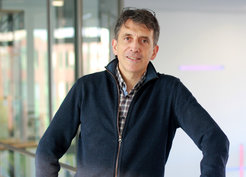Andrea Musacchio receives Leibniz Prize 2020
Andrea Musacchio receives the Leibniz Prize 2020 for his groundbreaking work on the control of cell division.
Every day millions of cells divide in our body. This central process in biology ensures growth, regeneration and wound healing. However, if the genetic information stored on the DNA in the chromosomes is not distributed equally between the two daughter cells, malformations or serious diseases such as cancer may result.
"Because only when we can recreate these processes and cell components will we be in a position to truly understand how they work""

Andrea Musacchio's research focuses on the control mechanisms that guarantee the smooth operation of these processes. He is investigating the structure and mode of action of a large number of the involved proteins. In particular, those that form the kinetochore - an attachment site on the chromosomes for the microtubules of the spindle apparatus that distributes the chromosomes. "Only by taking the system apart and simplifying it do we have a chance of understanding how the kinetochore works – so we modelled it in the lab," explains Musacchio. The reconstruction of an artificial, functional kinetochore enabled Musacchio to gain fundamental insights into the function and regulation of the kinetochore and made an outstanding contribution to understanding the critical phases of cell division.
A particularly critical step is to capture all chromosomes by the microtubules of the spindle apparatus via attachment to the kinetochores prior to their distributiuon. Andrea Musacchio identified a crucial control mechanism that ensures that cell division is delayed until really all chromosomes are attached. With the so-called Mad2 template model he created the basis for understanding the control of this step during cell division.
About Andrea Musacchio
Andrea Musacchio was born on July 11, 1964 in Rome. He studied biology at the Tor Vergata University in Rome (1985-1990). From 1991 to 1995 he earned his doctorate under the supervision of Matti Saraste at the European Molecular Biology Laboratory (EMBL)/University of Heidelberg. From 1995-1998 he was a postdoctoral fellow at the Harvard Medical School in the research group of Stephen C. Harrison before returning to Italy in 1999 to become a group leader in the Department of Experimental Oncology of the European Institute of Oncology in in Milan. There he was appointed professor in 2006.
Since January 2011 he has been the director of the Department of Mechanistic Cell Biology at the Max Planck Institute of Molecular Physiology.
Musacchio was elected a member of the European Molecular Biology Organization (EMBO) in 2009. He has received two ERC Advanced Grants (2009 and 2015) and will chair the Biomedical Section of the Max Planck Society in 2020.
Gottfried Wilhelm Leibniz Prize
The Gottfried Wilhelm Leibniz Prize is the most important research award in Germany. The Leibniz Programme, established in 1985, aims to improve the working conditions of outstanding researchers, expand their research opportunities, relieve them of administrative tasks, and help them employ particularly qualified early career researchers. A maximum of €2.5 million is provided per award. Prizewinners are first chosen from a slate of nominations put forward by third parties; the Joint Committee selects the actual prizewinners based on a recommendation from the Selection Committee for the Leibniz Programme.
